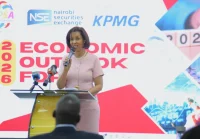Safaricom saw its profit after tax for the full year ended March 2023 fall 22.2% to hit Ksh52.5 billion, down from Ksh67.5 million the previous year.
The telco, East Africa’s largest company, saw its overall revenues increase 4.3% to Ksh310.9 billion, up from Ksh298 billion the previous year. Earnings before interest, tax, depreciation and amortization (EBITDA) fell 6.2% from the previous year to hit Ksh139.9 billion.
“This year, we all experienced tough headwinds, including high inflation, a depreciating shilling, severe drought, and failed rain seasons among others,” noted Safaricom CEO Peter Ndegwa, alluding to the larger macro-economic downturn in Kenya.
The Safaricom board recommended a dividend per share of Ksh1.20, a 13.7 percent decline from the previous year.
Describing the performance as ‘solid’, Safaricom CEO Peter Ndegwa vowed to prioritize improving services and continued expansion of Safaricom’s product range.
“We are committed to continue investing in our network infrastructure, broadening our product range, and leveraging emerging technologies to enhance our participation in the digital ecosystem,” he stated. He further promised increased support for the company’s sustainability and social responsibility programs.
READ>Ruto’s Multi-Billion Helicopter Business
Mobile money remained a key growth driver for Safaricom. M-Pesa revenues grew by 8.8% to hit Ksh117.2 billion.With Safaricom receiving a license to launch M-Pesa in Ethiopia on May 10, the company’s mobile money revenues are expected to keep growing.
Ndegwa also talked up the government-backed Hustler Fund credit scheme launched by President William Ruto last year for introducing more customers to Safaricom’s ecosystem.
“When Hustler Fund came into our ecosystem, we saw 2 million additional new customers coming on who were not using our services,” he disclosed.
Safaricom chair Adil Khawaja attributed the decline in profitability to factors including depressed economic activity during the electioneering period and the Communication Authority’s move to cut mobile termination rates (MTRs), which ate into Safaricom revenues.
“We note that these results were achieved in a tough environment that included rising inflation, Kenya shilling depreciation against global currencies, subdued economic activity during the general elections period and regulatory interventions such as the reduction in Mobile Termination Rates (MTRs),” he stated.
NEXT>Zimele: David Ndii’s Multi-Million Wealth Management Business

![The Safaricom board recommended a dividend per share of Ksh1.20, a 13.7 percent decline from the previous year. [Photo/ Safaricom]](https://businesstoday.co.ke/wp-content/uploads/2023/05/Fv07iuSXsAEQs66.jpg)











Leave a comment